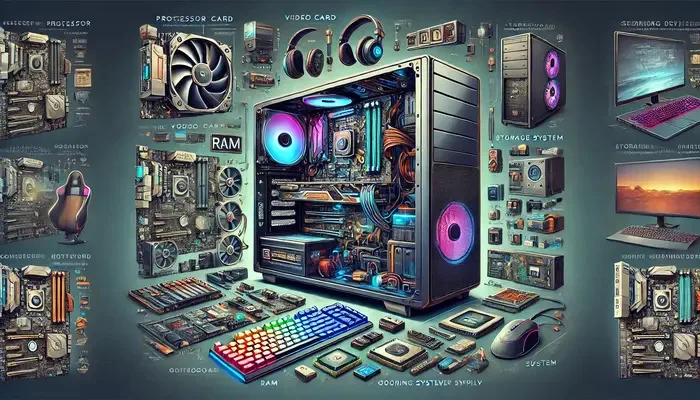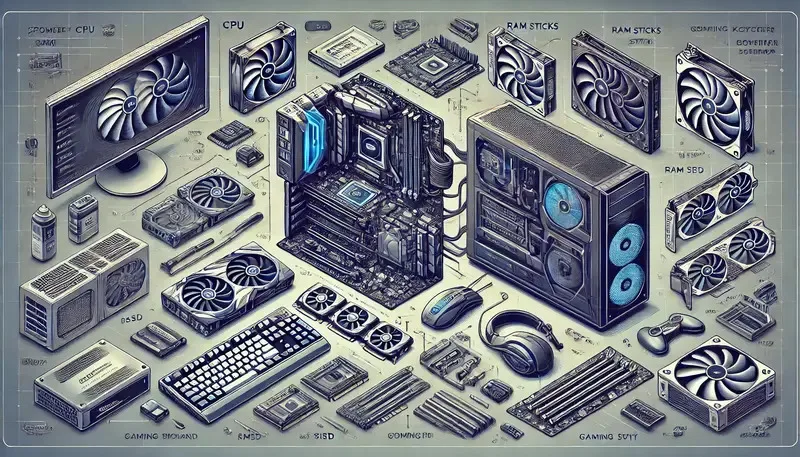
How to Choose a Gaming Computer: Main Characteristics and Recommendations
Selecting the right gaming computer is crucial for an immersive and enjoyable gaming experience. With the rapid advancements in technology, the variety of options can be overwhelming. This guide will help you navigate the key characteristics to consider when choosing a gaming computer, ensuring that you get the best performance and value for your investment.
The Main Characteristics of a Gaming Computer
Processor
The processor, or CPU, is the brain of your gaming computer. It handles the instructions and calculations necessary to run games and applications smoothly. For gaming, it’s essential to choose a processor with high clock speeds and multiple cores. Popular options include Intel’s Core i7 and i9 series or AMD’s Ryzen 7 and 9 series. These processors offer excellent performance for gaming and multitasking, ensuring that your games run without lag or stutter.
Video Card
The video card, or GPU, is the most critical component for gaming performance. It renders images and graphics, making your games look realistic and run smoothly. High-end GPUs like NVIDIA’s GeForce RTX 3080 or 3090 and AMD’s Radeon RX 6800 XT provide exceptional performance. When selecting a GPU, consider the types of games you play and the resolution at which you intend to play. For instance, Kartac casino requires a GPU that can handle high-resolution graphics to provide an immersive gaming experience.
RAM
Random Access Memory (RAM) is essential for storing data that your computer needs to access quickly. For gaming, 16GB of RAM is generally sufficient, but for more demanding games and multitasking, 32GB might be more appropriate. Ensure your RAM has a high speed (measured in MHz) to improve performance.
Storage Devices
There are two main types of storage devices: Hard Disk Drives (HDD) and Solid-State Drives (SSD). SSDs are faster and more reliable than HDDs, making them ideal for gaming. An SSD can significantly reduce load times and improve overall system responsiveness. A common setup includes a smaller SSD (250GB or 500GB) for the operating system and most-used games, along with a larger HDD (1TB or more) for additional storage.
Motherboard
The motherboard connects all the components of your gaming computer. It’s important to choose a motherboard that supports your CPU and GPU and has enough slots for RAM and additional peripherals. Features like USB-C ports, Wi-Fi, and Bluetooth can also be beneficial. Popular motherboards come from brands like ASUS, MSI, and Gigabyte.

Cooling System
A good cooling system is essential to prevent your gaming computer from overheating. High-performance components generate a lot of heat, especially during intense gaming sessions. Options include air cooling with fans or more advanced liquid cooling systems. Ensuring your computer has adequate cooling will extend the lifespan of your components and maintain optimal performance.
Power Supply
The power supply unit (PSU) provides power to all the components of your computer. It’s crucial to choose a PSU with enough wattage to support your system, including any future upgrades. A reliable PSU from brands like Corsair or EVGA with an 80 Plus certification for efficiency is recommended.
Additional Features
Monitor
The monitor is your window into the gaming world. Key factors to consider include resolution, refresh rate, and panel type. A 1440p resolution offers a good balance between performance and visual quality, while a refresh rate of 144Hz or higher provides smooth and fluid motion. Monitors with IPS panels offer better color accuracy and viewing angles compared to TN panels.
Peripherals
Peripherals like keyboards, mice, and headsets can enhance your gaming experience. Mechanical keyboards offer better tactile feedback and durability, while gaming mice with high DPI and customizable buttons improve precision and control. A good headset with surround sound can provide an immersive audio experience and improve communication in multiplayer games.
Choosing the right gaming computer involves balancing performance, budget, and personal preferences. By focusing on the key components like the processor, video card, RAM, storage, motherboard, cooling system, and power supply, you can build or buy a gaming computer that meets your needs. Additionally, selecting the right monitor and peripherals will further enhance your gaming experience. With careful consideration and planning, you can ensure that your gaming computer provides years of enjoyment and top-notch performance.